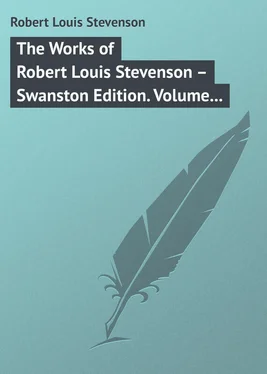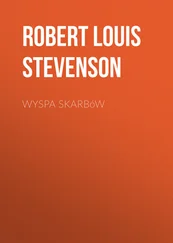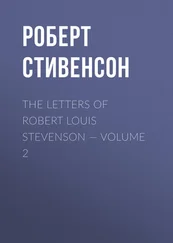Robert Stevenson - The Works of Robert Louis Stevenson – Swanston Edition. Volume 24
Здесь есть возможность читать онлайн «Robert Stevenson - The Works of Robert Louis Stevenson – Swanston Edition. Volume 24» — ознакомительный отрывок электронной книги совершенно бесплатно, а после прочтения отрывка купить полную версию. В некоторых случаях можно слушать аудио, скачать через торрент в формате fb2 и присутствует краткое содержание. Жанр: foreign_prose, на английском языке. Описание произведения, (предисловие) а так же отзывы посетителей доступны на портале библиотеки ЛибКат.
- Название:The Works of Robert Louis Stevenson – Swanston Edition. Volume 24
- Автор:
- Жанр:
- Год:неизвестен
- ISBN:нет данных
- Рейтинг книги:3 / 5. Голосов: 1
-
Избранное:Добавить в избранное
- Отзывы:
-
Ваша оценка:
- 60
- 1
- 2
- 3
- 4
- 5
The Works of Robert Louis Stevenson – Swanston Edition. Volume 24: краткое содержание, описание и аннотация
Предлагаем к чтению аннотацию, описание, краткое содержание или предисловие (зависит от того, что написал сам автор книги «The Works of Robert Louis Stevenson – Swanston Edition. Volume 24»). Если вы не нашли необходимую информацию о книге — напишите в комментариях, мы постараемся отыскать её.
The Works of Robert Louis Stevenson – Swanston Edition. Volume 24 — читать онлайн ознакомительный отрывок
Ниже представлен текст книги, разбитый по страницам. Система сохранения места последней прочитанной страницы, позволяет с удобством читать онлайн бесплатно книгу «The Works of Robert Louis Stevenson – Swanston Edition. Volume 24», без необходимости каждый раз заново искать на чём Вы остановились. Поставьте закладку, и сможете в любой момент перейти на страницу, на которой закончили чтение.
Интервал:
Закладка:
To Mr. Dick
This correspondent was for many years head clerk and confidential assistant in the family firm at Edinburgh.
La Solitude, Hyères, 12th March 1884.MY DEAR MR. DICK, – I have been a great while owing you a letter; but I am not without excuses, as you have heard. I overworked to get a piece of work finished before I had my holiday, thinking to enjoy it more; and instead of that, the machinery near hand came sundry in my hands! like Murdie’s uniform. However, I am now, I think, in a fair way of recovery; I think I was made, what there is of me, of whipcord and thorn-switches; surely I am tough! But I fancy I shall not overdrive again, or not so long. It is my theory that work is highly beneficial, but that it should, if possible, and certainly for such partially broken-down instruments as the thing I call my body, be taken in batches, with a clear break and breathing space between. I always do vary my work, laying one thing aside to take up another, not merely because I believe it rests the brain, but because I have found it most beneficial to the result. Reading, Bacon says, makes a full man, but what makes me full on any subject is to banish it for a time from all my thoughts. However, what I now propose is, out of every quarter to work two months, and rest the third. I believe I shall get more done, as I generally manage, on my present scheme, to have four months’ impotent illness and two of imperfect health – one before, one after, I break down. This, at least, is not an economical division of the year.
I re-read the other day that heartbreaking book, the Life of Scott . One should read such works now and then, but O, not often. As I live, I feel more and more that literature should be cheerful and brave-spirited, even if it cannot be made beautiful and pious and heroic. We wish it to be a green place; the Waverley Novels are better to re-read than the over-true Life , fine as dear Sir Walter was. The Bible, in most parts, is a cheerful book; it is our little piping theologies, tracts, and sermons that are dull and dowie; and even the Shorter Catechism, which is scarcely a work of consolation, opens with the best and shortest and completest sermon ever written – upon Man’s chief end. – Believe me, my dear Mr. Dick, very sincerely yours,
Robert Louis Stevenson.P.S. – You see I have changed my hand. I was threatened apparently with scrivener’s cramp, and at any rate had got to write so small, that the revisal of my MS. tried my eyes, hence my signature alone remains upon the old model; for it appears that if I changed that, I should be cut off from my “vivers.”
R. L. S.To Cosmo Monkhouse
This amiable and excellent public servant, art-critic, and versifier was a friend of old Savile Club days; the drift of his letter can easily be guessed from this reply. The reference to Lamb is to the essay on the Restoration dramatists.
La Solitude, Hyères, March 16, 1884.MY DEAR MONKHOUSE, – You see with what promptitude I plunge into correspondence; but the truth is, I am condemned to a complete inaction, stagnate dismally, and love a letter. Yours, which would have been welcome at any time, was thus doubly precious.
Dover sounds somewhat shiveringly in my ears. You should see the weather I have – cloudless, clear as crystal, with just a punkah-draft of the most aromatic air, all pine and gum tree. You would be ashamed of Dover; you would scruple to refer, sir, to a spot so paltry. To be idle at Dover is a strange pretension; pray, how do you warm yourself? If I were there I should grind knives or write blank verse, or – But at least you do not bathe? It is idle to deny it: I have – I may say I nourish – a growing jealousy of the robust, large-legged, healthy Britain-dwellers, patient of grog, scorners of the timid umbrella, innocuously breathing fog: all which I once was, and I am ashamed to say liked it. How ignorant is youth! grossly rolling among unselected pleasures; and how nobler, purer, sweeter, and lighter, to sip the choice tonic, to recline in the luxurious invalid chair, and to tread, well-shawled, the little round of the constitutional. Seriously, do you like to repose? Ye gods, I hate it. I never rest with any acceptation; I do not know what people mean who say they like sleep and that damned bedtime which, since long ere I was breeched, has rung a knell to all my day’s doings and beings. And when a man, seemingly sane, tells me he has “fallen in love with stagnation,” I can only say to him, “You will never be a Pirate!” This may not cause any regret to Mrs. Monkhouse; but in your own soul it will clang hollow – think of it! Never! After all boyhood’s aspirations and youth’s immoral day-dreams, you are condemned to sit down, grossly draw in your chair to the fat board, and be a beastly Burgess till you die. Can it be? Is there not some escape, some furlough from the Moral Law, some holiday jaunt contrivable into a Better Land? Shall we never shed blood? This prospect is too grey.
Here lies a man who never did
Anything but what he was bid;
Who lived his life in paltry ease,
And died of commonplace disease.
To confess plainly, I had intended to spend my life (or any leisure I might have from Piracy upon the high seas) as the leader of a great horde of irregular cavalry, devastating whole valleys. I can still, looking back, see myself in many favourite attitudes; signalling for a boat from my pirate ship with a pocket-handkerchief, I at the jetty end, and one or two of my bold blades keeping the crowd at bay; or else turning in the saddle to look back at my whole command (some five thousand strong) following me at the hand-gallop up the road out of the burning valley: this last by moonlight.
Et point du tout. I am a poor scribe, and have scarce broken a commandment to mention, and have recently dined upon cold veal! As for you (who probably had some ambitions), I hear of you living at Dover, in lodgings, like the beasts of the field. But in heaven, when we get there, we shall have a good time, and see some real carnage. For heaven is – must be – that great Kingdom of Antinomia, which Lamb saw dimly adumbrated in the Country Wife , where the worm which never dies (the conscience) peacefully expires, and the sinner lies down beside the Ten Commandments. Till then, here a sheer hulk lies poor Tom Bowling, with neither health nor vice for anything more spirited than procrastination, which I may well call the Consolation Stakes of Wickedness; and by whose diligent practice, without the least amusement to ourselves, we can rob the orphan and bring down grey hairs with sorrow to the dust.
This astonishing gush of nonsense I now hasten to close, envelope, and expedite to Shakespeare’s Cliff. Remember me to Shakespeare, and believe me, yours very sincerely,
Robert Louis Stevenson.To Edmund Gosse
Mr. Gosse had written describing the office which he then occupied, a picturesque old-fashioned chamber in the upper stories of the Board of Trade.
La Solitude, Hyères, March 17, 1884.MY DEAR GOSSE, – Your office – office is profanely said – your bower upon the leads is divine. Have you, like Pepys, “the right to fiddle” there? I see you mount the companion, barbiton in hand, and, fluttered about by city sparrows, pour forth your spirit in a voluntary. Now when the spring begins, you must lay in your flowers: how do you say about a potted hawthorn? Would it bloom? Wallflower is a choice pot-herb; lily-of-the-valley, too, and carnation, and Indian cress trailed about the window, is not only beautiful by colour, but the leaves are good to eat. I recommend thyme and rosemary for the aroma, which should not be left upon one side; they are good quiet growths.
Читать дальшеИнтервал:
Закладка:
Похожие книги на «The Works of Robert Louis Stevenson – Swanston Edition. Volume 24»
Представляем Вашему вниманию похожие книги на «The Works of Robert Louis Stevenson – Swanston Edition. Volume 24» списком для выбора. Мы отобрали схожую по названию и смыслу литературу в надежде предоставить читателям больше вариантов отыскать новые, интересные, ещё непрочитанные произведения.
Обсуждение, отзывы о книге «The Works of Robert Louis Stevenson – Swanston Edition. Volume 24» и просто собственные мнения читателей. Оставьте ваши комментарии, напишите, что Вы думаете о произведении, его смысле или главных героях. Укажите что конкретно понравилось, а что нет, и почему Вы так считаете.










